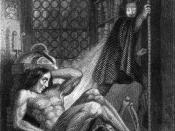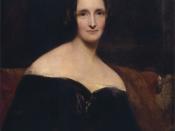The desire to make history to discover what remains undiscovered, or to know what remains unknown is an everlasting human goal. Although many have failed to realize this dream, a very few have been passionately successful in its pursuit. The immortality power that these select few have, of course, only provided to encourage those who come after. Mary Wollstonecraft Shelley's Frankenstein is a literary reflection upon this intensely human desire here illustrated by the title character's quest for personal glory by means of scientific discovery.
Moreover, both Victor Frankenstein and the Arctic explorer Robert Walton, whose letters open the novel, hold a greedy thirst for privileged knowledge of those things that are unknown to the common person. Nevertheless, Shelley presents their stories as being in some sense similar to each other. Each one of them is a failure, and each suffers from the same fatal flaw. Walton, a voyager, explores the secrets of the natural earth, in the company of a crew of men on the same mission.
However, Victor works in privacy to enter secrets of a physical nature, specifically, the principle of life. Though they explore entirely different lands, Walton and Victor are both bound by a common cause. Each tries to further the knowledge of mankind and to glorify his own name.
Furthermore, as the story goes along the mood is quite serious throughout the novel, particularly with the entry of the monster. It does have some touching episodes of happy family life among the Frankenstein's, as well as among the De Lacey's. Then again, these are not sufficient to counter the sense of horror and brutality that is aroused by the violence enacted by the monster. The mood is almost cold towards the end of the novel, with Victor coming to terms with the deaths...


